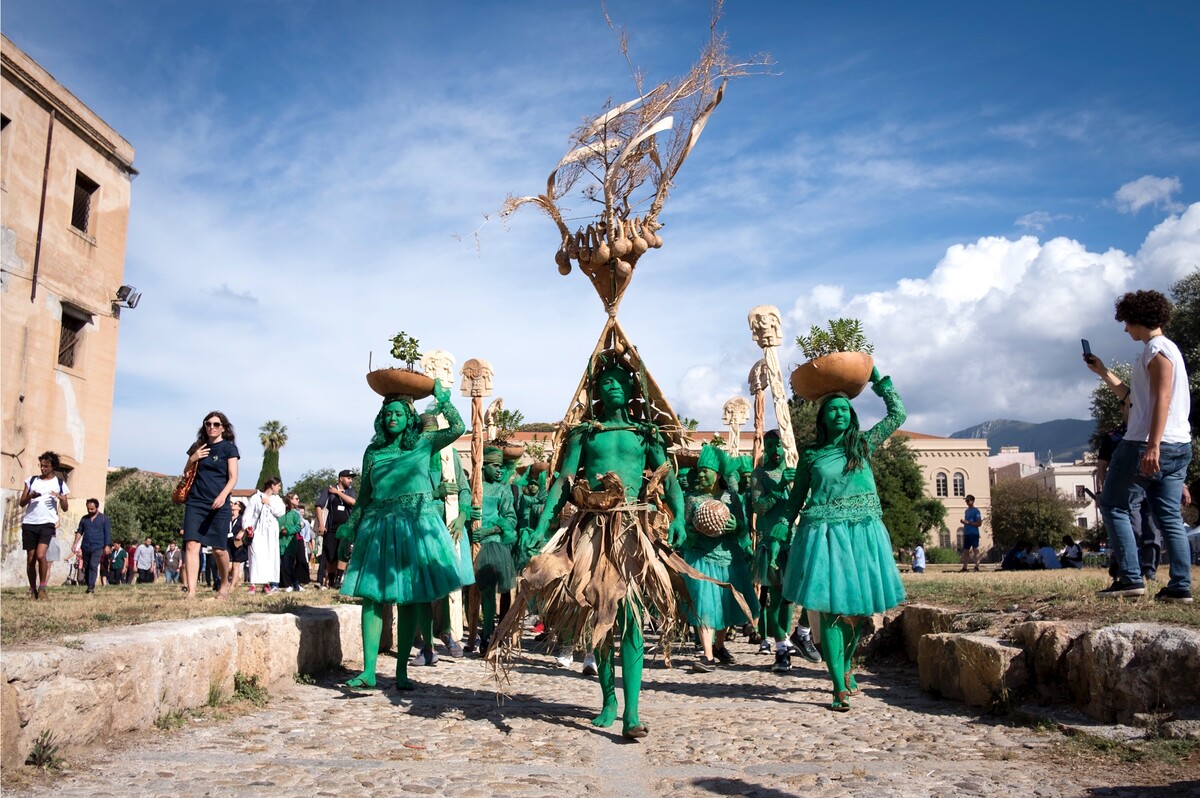Last month the Lagos-based artist Jelili Atiku trod tenderly through a public square in London, weighed down by maquettes strapped to his feet. Small sculptures, mounted on a large cardboard box daubed with “Pfizer,” “Kano,” and “1996,” obscured his vision. The performance—titled Wórowòro, Kóbokòbo and shown as part the group exhibition “In a Pot of Hot Soup: Art and the Articulation of Politics in Nigeria” at the Brunei Gallery in the School of Oriental and African Studies (SOAS) at the University of London—was Atiku’s response to the Pfizer drug trial scandal of 1996 and its impact on our pandemic-scarred present. During that controversy, the pharmaceutical giant pledged to combat a meningitis epidemic in Kano, northern Nigeria, by trialling a new drug on 200 infected children, leaving eleven dead and dozens more injured.
Atiku’s work across drawing, multimedia installation, and performance combines Yoruba performance traditions with political activism to address subjects including human rights abuses and postcolonial trauma, at times with the intention of directly provoking political change. In 2016, he was arrested in Ejigbo, Lagos, on charges of “public disturbance and inciting the public” over his performance work Aragamago Will Rid this Land of Terrorism. The piece, which invoked Yoruba deities, drew attention to the brutal and underreported torture and rape of three women accused of stealing pepper from a market in Ejigbo in 2014. When Oba Morufu Adisa A. Ojoola, the king of Ejigbo, complained to the police about the work, Atiku was remanded in a maximum security prison alongside other performers and audience members. Following an international outcry, the charges were later dropped.
Trained as a sculptor, Atiku started making performance works in the late noughties. He represented Nigeria at the 2017 Venice Biennale and has performed at institutions including CCA Lagos, London’s Tate Modern, and Manifesta 12 (where he led a processional performance addressing themes of ecological destruction, migration, and West African mythology). The recipient of numerous awards and grants, including the 2015 Prince Claus Award, he was included in Phaidon’s landmark 2021 survey African Artists: From 1882 to Now. I sat down with him after his performance to discuss the role of live art in catalyzing change, his approach to performance, and how he protects himself in a plagued planet.
Akin Oladimeji: Why did you decide to make a performance about a scandal which took place 26 years in the past?
Jelili Atiku: During the pandemic, the Nigerian government prescribed mandatory vaccinations. For many people in the country, this recalled the Pfizer vaccinations scandal in Kano in 1996. This program could be thought of as a form of experimentation on human beings. A lot of children were affected; some were paralyzed. So, of course, many people didn’t trust this new vaccination. We were thrown into a dilemma: do we take the vaccine or not?
Coupled to this, no one was given the opportunity to trust indigenous medicine. The government do not believe in it. And most of us, especially the locals, believe in—I mean, can only afford—indigenous medication. During the pandemic, we had to trust our lives to western pharmaceutical companies. Before I took the vaccine, I sought assurance that it would not affect my body, because my body is my vehicle as an artist. Wórowòro, Kóbokòbo is about questioning some of the things that the pharmaceutical companies bring to us in Africa and which we will, in trust, take.
AO: When creating a work to be performed internationally, do you ever feel anxious that it will not travel well—that it won’t be fully understood by people outside the Nigerian context?
JA: My performances are designed to open a dialogue with people. Whenever I go to a new area, I research its history and create my performances with shared memories. Nobody can tell me that, here in the UK, people don’t know about the experiences other societies have had with pharmaceutical companies. Of course, I can’t remove my own experience from my performance because my body is involved. The imagery I create through each performance is predominantly influenced by my own memory, but in collaboration with the memory of the space in which I perform. In each performance, I aim to present an image that will negotiate with the audience’s own memories.
AO: For your 2013 performance Senator Yerima’s Wedding, you hired two actors: one was a girl and the other, an adult, posed as an official licensed to marry couples. You then “married” the child actor in order to highlight the abuse of power and sexual exploitation of children by the powerful—in 2010, the Nigerian senator named in the work’s title married a 13-year-old girl, triggering widespread protests across the country. The performance took place on the street, and members of the public stoned you during it. Do you think that this kind of performance art, these processes of dialogue, can be tools for effecting political change?
JA: Yes. In 2016, I was arrested after my performance Aragamago Will Rid this Land of Terrorism. I was thrown into jail because the content, the imagery, and also the language of the performance provoked the king of my community. He was really touched by that image. Bringing out an effective image and action can really, really project strong energy and penetrate the psyche of the beholder. Performance allows me to do this because it’s a kind of organic material that allows me to burrow into and influence the psyche of a given person.
AO: During today’s performance, you created a four-sided border or boundary around yourself on the ground in the square in front of SOAS. How does that relate to these ideas?
JA: I created the border using a powdered chalk, which traditionally symbolizes purity. When you are having an interaction—whether it’s in business, politics, or whatever—you’re dealing with the world. The square represents the four corners of the world, and the idea that every interaction must be made with a clean mind.
I was thinking of the pharmaceutical companies. I find it very disturbing that anyone could test their medicine on another person’s body. So I wanted to create a space of clean attitudes and clean interactions. I borrow that from the Obatala ritual of cleansing, of connecting to the holiness of things.
AO: What is the significance of the small sculptures, which resemble indigenous Yoruba carvings, that you tied to your feet?
JA: I wanted to consider why western pharmaceutical companies come to Africa to test their drugs. Why Nigerians, for example, are not depending on their own medications, or local physicians, but look outside to heal themselves. In looking outside, you make it possible for people to use you as an experiment. Those props derive from forms created by the Yoruba people. It’s depressing that this ancestral knowledge is not used, but rather becomes like a decoration.
AO: In previous works, you have taken the materials you planned to use in your performances to a traditional Yoruba priest, so that he could activate them. Did you perform a ritual to imbue these sculptures with power?
JA: This time it was not necessary. This is more like a protest piece. Somebody asked me after the performance why I focused on Europe. I said the pharmaceutical companies are based in Europe and are capitalist in their motives. They want to get more from Africa. And in getting more they destroy us. So I want to make it possible for Europeans to see the effects of what they are doing to us.
AO: What are you working on next?
JA: I will be in Denmark this September, giving a performance procession as part of the Aarhus Festival. The performance is to do with the rituals of aligning the energy of children when they have been abused and neglected. It involves the public. I have created 201 small wooden sculptures that embody the energy of Irunmole [divine spirits in the Yoruba religion]. The public will carry them on small white plates, transporting the energy of manifestation through the streets. It excites me!

